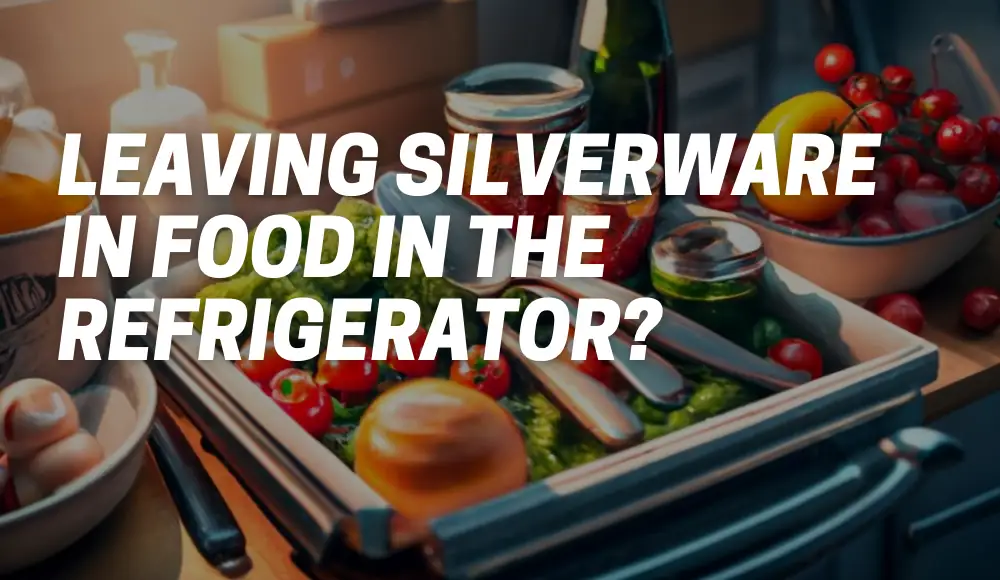We’ve all been there – you’ve enjoyed a delicious meal and now have some leftovers. You contemplate whether it’s safe and practical to leave your silverware in the food before storing it in the refrigerator. In this article, we will explore the ins and outs of “Silverware in Food.” We’ll answer common questions and provide you with expert advice on safe and effective food storage practices.
Is it safe to leave silverware in food in the refrigerator?
TL;DR: Leaving silverware in food in the refrigerator is generally safe, but there are exceptions. Avoid storing highly acidic or salty foods wi th silverware as it can cause discoloration or damage to the utensils, or the metals may leak into the food. and lead to some health side effects.
Many people wonder whether it’s safe to leave their silverware in leftover food inside the fridge. The answer is generally yes, but with a few caveats. It’s safe to store most foods with silverware, but some considerations are crucial. Highly acidic or salty foods can affect the quality of the silverware and the taste of the food. Also, with time the metals may leak into the food and lead to some health side effects. For instance, storing a metal fork in a container of tomato sauce can cause the fork to tarnish and the sauce to taste metallic.
To ensure safety, consider the following:
- Opt for stainless steel or food-grade utensils.
- Clean the silverware before storage to prevent contamination.
- Use airtight containers to seal the food and utensils properly.
Can you put metal in the fridge with food?
TL;DR: You can safely store metal utensils in the fridge with most foods, but avoid doing so with highly acidic or salty dishes.
Metal utensils, including forks, knives, and spoons, can generally be safely stored in the refrigerator alongside your food. However, the type of food matters. Highly acidic or salty foods can corrode or tarnish the metal, affecting the quality of both the utensils and the food.
For instance, if you’re storing a hearty beef stew, it’s perfectly fine to leave the ladle or serving spoon in the dish. On the other hand, keeping a silver fork in a container of lemon vinaigrette is not advisable, as it might alter the taste and quality of both the fork and the vinaigrette.
Can you put metal in the fridge with food – User Advice
Here is a table summarizing the main points from the user comments regarding whether you can put metal in the fridge with food:
| Main Points |
|---|
| Stainless steel silverware is generally safe in the fridge. Other metals may leach into food if left for an extended period. Canned foods have a protective coating. |
| Uncertain about putting spoons in the fridge but aware of not putting them in the microwave. |
| Uncertain but mentions concerns about cans in the fridge. |
| Canned drinks are fine in the fridge, but open cans should not be used for food storage. |
| Acidic foods can react with open cans, leaching metals into the food over time. Cutlery with bacteria should be avoided in the fridge. |
| You can put any utensil in the fridge, but avoid putting metal in the microwave. |
| Shares a personal experience related to metal in the microwave. |
| Putting spoons in the fridge won’t cause harm; they may get very cold. |
| Discusses the sticking of cold utensils to lips and the impact of car lights. Unclear about cans. |
| Aluminum in canned foods can leach into the food, but eating enough to make an adult ill is unlikely. Suggests using alternative food storage containers. |
| Personal experience suggests no harm in leaving utensils in the fridge with food. |
| Mentions etching and migration of metal ions from utensils into acidic foods, leading to off-flavor and color changes. |
| Disagrees with the notion that leaving utensils in the fridge poisons food but suggests that leaving utensils with leftovers may not be a good practice. |
| Expresses skepticism about the idea of refrigerated metal poisoning food and suggests bacterial contamination is a greater concern. |
| Provides examples of metal reactions with acidic foods like tomatoes. |
| Stainless steel silverware is non-reactive and generally safe in the fridge. Other metals may leach into the food if not stainless steel. |
Please note that while some comments focus on utensils, others mention concerns about canned foods and their interaction with metal. Overall, the consensus is that stainless steel utensils are generally safe in the fridge, while other types of metals can leach into food if left for extended periods.
What are the best practices for storing leftovers in the refrigerator?
TL;DR: Follow these best practices to ensure safe and effective leftover storage: use airtight containers, label and date leftovers, and maintain proper refrigerator temperature.
Storing leftovers safely in the refrigerator is essential to maintain food quality and prevent foodborne illnesses. Here are some best practices to follow:
- Use Airtight Containers: Airtight containers help keep food fresh and prevent odors from spreading to other items in the fridge. They also protect your silverware from contaminants.
- Label and Date Leftovers: Labeling and dating leftovers can help you keep track of how long they’ve been in the fridge, ensuring you consume them while they’re still safe to eat.
- Maintain Proper Refrigerator Temperature: Your fridge should be set to a temperature of 40°F (4°C) or lower to slow the growth of bacteria. Use a refrigerator thermometer to monitor the temperature accurately.
- Store Raw and Cooked Foods Separately: To avoid cross-contamination, keep raw and cooked foods in separate containers.
Are there any food safety guidelines for storing utensils in food in the fridge?
TL;DR: While there aren’t specific guidelines for storing utensils in food, it’s essential to maintain cleanliness and follow general food safety practices.
While there aren’t specific guidelines for storing utensils in food in the refrigerator, it’s crucial to practice general food safety. Here are some tips:
- Cleanliness: Ensure your silverware is clean and free from any food residues before placing them in the fridge.
- Use Food-Grade Utensils: Opt for stainless steel or other food-grade utensils to avoid potential reactions with the food.
- Separation: When storing highly acidic or salty foods, consider keeping the utensils separate to prevent any undesirable interactions.
What types of food are safe to store with silverware, and which should be avoided?
TL;DR: Most foods are safe to store with silverware, but avoid highly acidic or salty foods. Use food-grade utensils for best results.
In general, most foods can be safely stored with silverware, and it won’t significantly affect their taste or quality. However, it’s best to avoid highly acidic or salty foods like tomato-based dishes or pickles, as they can cause a reaction with the metal.
For the best results:
- Use stainless steel or food-grade utensils.
- Store silverware with foods that won’t adversely interact with the metal.
Table: Compatibility of Silverware with Common Foods
| Type of Food | Compatibility with Silverware |
|---|---|
| Leftover Pizza | Safe |
| Chicken Stir-Fry | Safe |
| Fresh Fruit Salad | Safe |
| Tomato-Based Pasta | Avoid |
| Pickles | Avoid |
| Citrus Fruits | Avoid |
In conclusion, leaving silverware in food in the refrigerator is generally safe, but you should exercise caution with highly acidic or salty dishes. It’s vital to use food-grade utensils, maintain cleanliness, and follow proper food safety guidelines to ensure that your leftovers remain fresh and free from contamination.
For more information on food safety and storage, you can refer to authoritative sources such as the USDA Food Safety and Inspection Service and FoodSafety.gov.

